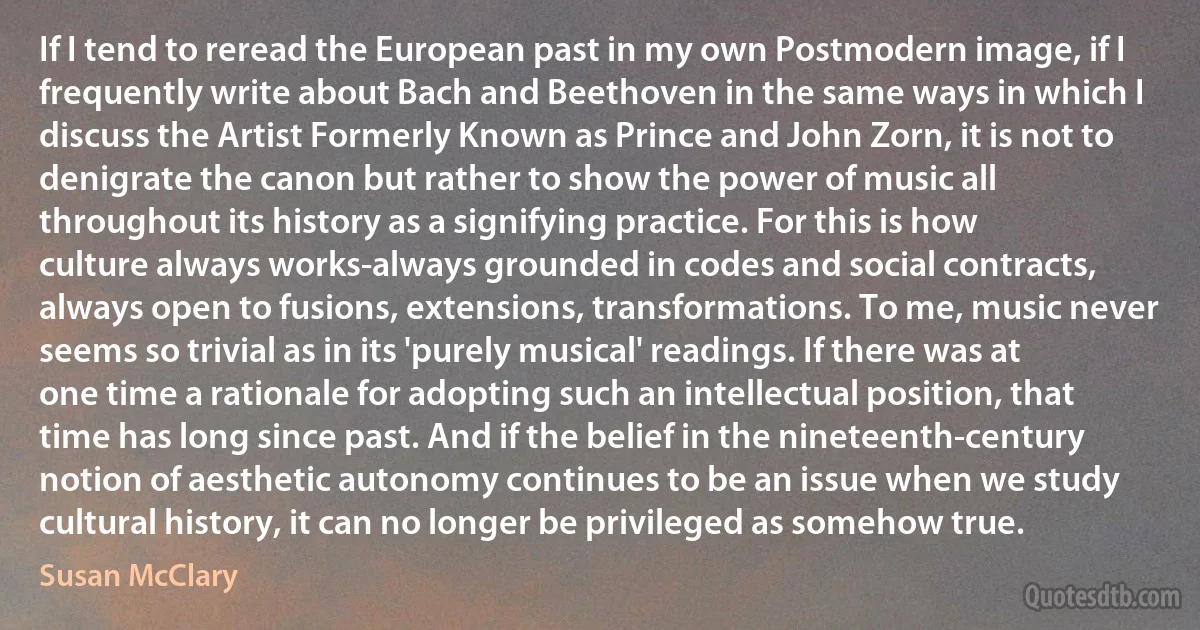
If I tend to reread the European past in my own Postmodern image, if I frequently write about Bach and Beethoven in the same ways in which I discuss the Artist Formerly Known as Prince and John Zorn, it is not to denigrate the canon but rather to show the power of music all throughout its history as a signifying practice. For this is how culture always works-always grounded in codes and social contracts, always open to fusions, extensions, transformations. To me, music never seems so trivial as in its 'purely musical' readings. If there was at one time a rationale for adopting such an intellectual position, that time has long since past. And if the belief in the nineteenth-century notion of aesthetic autonomy continues to be an issue when we study cultural history, it can no longer be privileged as somehow true.
Susan McClaryRelated topics
aesthetic autonomy history intellectual john known longer music open past position power practice prince show signifying study time write bach Beethoven postmodern reread waysRelated quotes
The higher culture of the West-whose moral, aesthetic, and intellectual values industrial society still professes-was a pre-technological culture in a functional as well as chronological sense. Its validity was derived from the experience of a world which no longer exists and which cannot be recaptured because it is in a strict sense invalidated by technological society. Moreover, it remained to a large degree a feudal culture, even when the bourgeois period gave it some of its most lasting formulations. It was feudal not only because of its confinement to privileged minorities, not only because of its inherent romantic element (which will be discussed presently), but also because its authentic works expressed a conscious, methodical alienation from the entire sphere of business and industry, and from its calculable and profitable order.

Herbert Marcuse
Now the Disney Corporation could do this because that culture lived in a commons, an intellectual commons, a cultural commons, where people could freely take and build. It was a lawyer-free zone.
It was culture, which you didn't need the permission of someone else to take and build upon. That was the character of creativity at the birth of the last century. It was built upon a constitutional requirement that protection be for limited times, and it was originally limited. Fourteen years, if the author lived, then 28, then in 1831 it went to 42, then in 1909 it went to 56, and then magically, starting in 1962, look - no hands, the term expands.
Eleven times in the last 40 years it has been extended for existing works - not just for new works that are going to be created, but existing works. The most recent is the Sonny Bono copyright term extension act.

Lawrence Lessig
As a graduate student at Yale, I studied the whole of Christian theology but focused my attention on the Darwinian controversies. I wanted to get to the root of the conflict between Darwinian evolution and Christian doctrine. In the course of my research I learned (to my surprise) that biblical chronology played almost no role in the 19th- century controversies, since most theologians had already accepted geological evidence for the age of the earth and re-interpreted the days in Genesis as long periods of time. Instead, the central issue was design. God created the cosmos with a plan in mind. This affirmation is among the most basic in all of Christianity (and other theistic religions as well, including Unificationism). And that plan included human beings as the final outcome of the creative process: we are created in the image of God.

Jonathan Wells
No Continental country has ever been able to understand the temper of the British people, but, while I give them a note of warning of our foreign critics, let me say what is more to the point to my own friends, that unless they bestir themselves Great Britain will be in a position of peril which it has not known in the memory of their fathers, their grandfathers, their great grandfathers, and if that position of peril should issue in some great catastrophe...this country will not again easily arise. (Hear, hear.) I do not believe there is going to be war between this country and any great foreign Power. (Hear, hear.) Heaven knows I do not desire it, but I do not believe it. Please remember the absolutely only way in which you can secure the peace which you all desire is that you shall be sure of victory if war takes place. (Cheers.)

Arthur Balfour
We have entered a time of global transition marked by uniquely contradictory trends. Regional and continental associations of States are evolving ways to deepen cooperation and ease some of the contentious characteristics of sovereign and nationalistic rivalries. National boundaries are blurred by advanced communications and global commerce, and by the decisions of States to yield some sovereign prerogatives to larger, common political associations. At the same time, however, fierce new assertions of nationalism and sovereignty spring up, and the cohesion of States is threatened by brutal ethnic, religious, social, cultural or linguistic strife. Social peace is challenged on the one hand by new assertions of discrimination and exclusion and, on the other, by acts of terrorism seeking to undermine evolution and change through democratic means.

Boutros Boutros-Ghali
